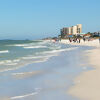14 Nights | Transatlantic
You will visit the following 6 places:

Tenerife
Tenerife is the largest and most populated island of the seven Canary Islands; it is also the most populated island of Spain. Tenerife is also the largest and most populous island of Macaronesia. About five million tourists visit Tenerife each year, the most of any of the Canary Islands. It is also one of the most important tourist destinations in Spain and the world. Tenerife hosts one of the world's largest carnivals and the Carnival of Santa Cruz de Tenerife is attempting to become a World Heritage Site. The island is home to the University of La Laguna, which was founded in 1792 and is the oldest university in the Canaries. San Cristóbal de La Laguna (a World Heritage Site) is the second city of the island and the third one of the archipelago. The city of La Laguna was also capital of the Canary Islands until Santa Cruz replaced it in 1833. In the Teide National Park (World Heritage Site), in the center of the island, is the highest elevation of Spain as well as the highest of the islands of the Atlantic Ocean, and the third largest volcano in the world from its base, Teide. Also located on the island Macizo de Anaga since 2015 is Biosphere Reserve and is the place that has the largest number of endemic species in Europe. The island's capital contains the architectural symbol of the Canary Islands, the modern Auditorio de Tenerife.

Málaga
Málaga is a large city in the southern Spanish region of Andalucia and capital of the Malaga Province. The largest city on the Costa del Sol, Malaga has a typical Mediterranean climate and is also known as the birthplace of famous Spanish artist Pablo Picasso. The city offers beaches, hiking, architectural sites, art museums, excellent shopping and cuisine. While more laid back than Madrid or Barcelona, Malaga is still the center and transport hub for the hugely popular Costa del Sol region, which is flooded with tourists in the summer, and the city has certainly cashed in on the sun and sand, with lots of new construction as well as hotels and facilities geared to tourists. However, Malaga also offers some genuinely interesting historical and cultural attractions in its old city and its setting on the coast is still beautiful.

Tampa
Tampa is a Gulf Coast Bay city in the U.S. state of Florida. It serves as the county seat for Hillsborough County. Tampa is located on the west coast of Florida. The population of Tampa in 2000 was 303,447. According to the 2009 estimates, the city's population had grown to 343,890, making it the 54th largest city in the United States. The current location of Tampa was once inhabited by various indigenous cultures, most recently the Tocobaga. It was spotted by Spanish explorers in the early 16th century, but there were no permanent American or European settlements in the area until 1824, when the US Army established a frontier outpost called Fort Brooke at the site of today's Tampa Convention Center. The village of Tampa began as a small group of pioneers who settled near the fort for protection from the Seminole population in the area.

Barcelona
Barcelona – Spain's enchanting capital, second largest and most populous city. It is a huge city that vibrates with life, and there’s certainly not another city in the country to touch it for its sheer style, looks or energy. It is one of the world's leading tourist, economic, trade fair and cultural centers, and its influence in commerce, education, entertainment, media, fashion, science, and the arts all contribute to its status as one of the world's major global cities. Barcelona is home to masterpieces of many great architects – the most famous of which is Antoni Gaudí.

Key West
Key West is an island in the Straits of Florida on the North American continent at the southernmost tip of the Florida Keys. It is considered the southernmost city in the continental United States. The city also occupies nearby islands and portions of nearby islands. It’s popularly known for its stunning beaches, coral reefs – destinations for diving and snorkeling.

La Palma Island
La Palma, also San Miguel de La Palma, is the most north-westerly island of the Canary Islands,Spain. La Palma has an area of 706 km2 making it the fifth largest of the seven main Canary Islands. La Palma, like the other islands of the Canary Island archipelago, is also a volcanic ocean island. It is truly an idyllic spot with numerous ecological treasures.








